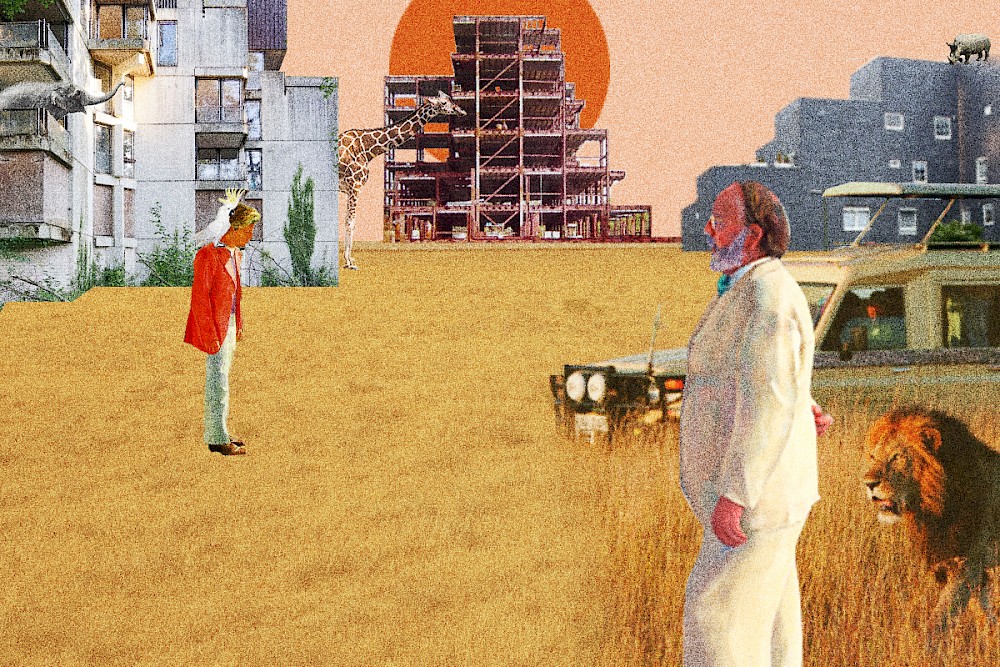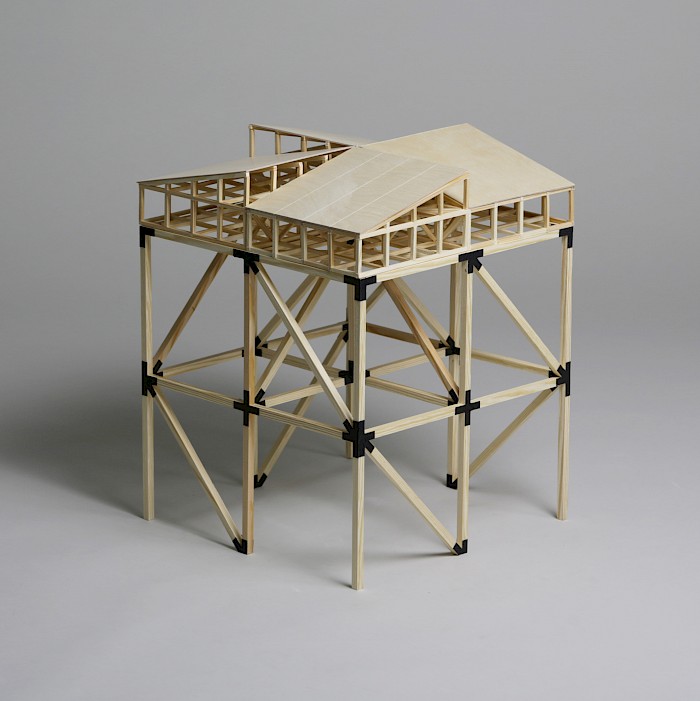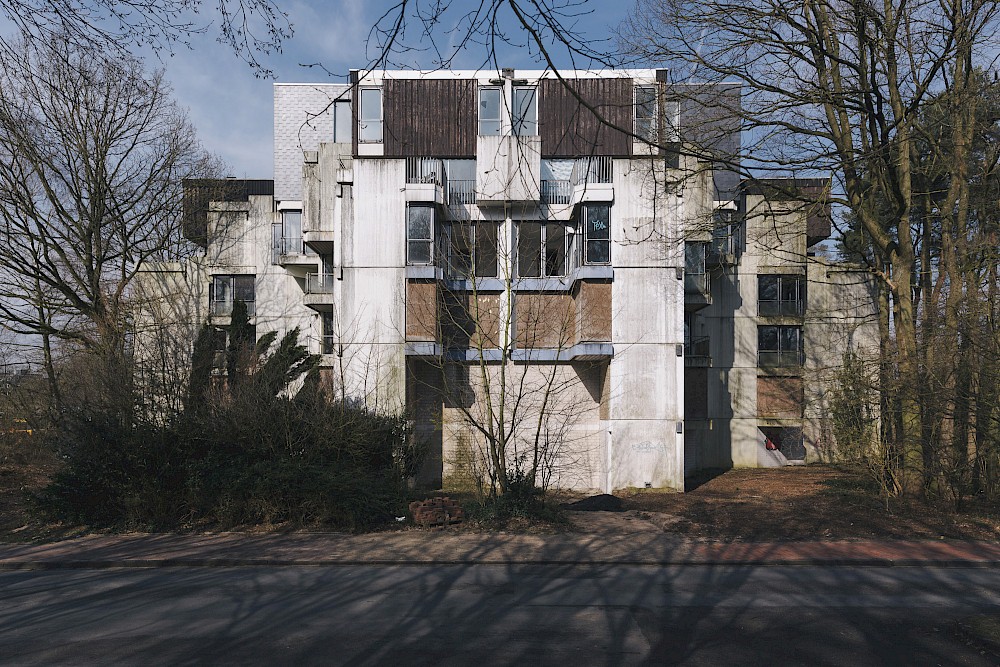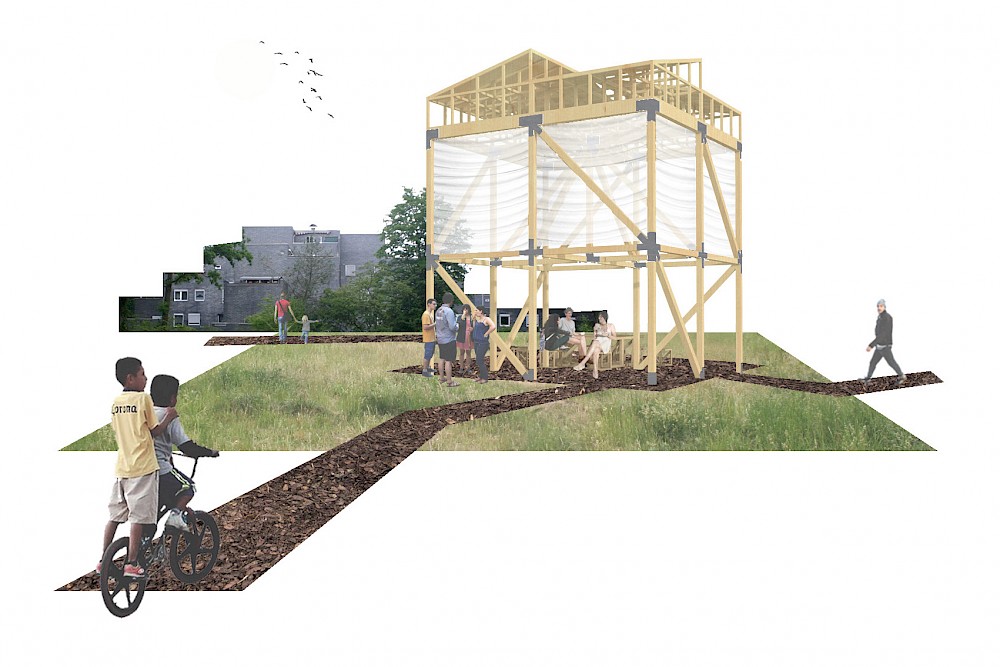Goodbye Utopia - Back to the city of the future

The "New City of Wulfen" is considered an exemplary and controversially discussed prime example of a planned city from the 1960s. In addition to futuristic urban planning with a strict separation of streets and pedestrian areas, the experimental buildings Finnstadt, Metastadt and Habiflex, supported by the federal government, were important contributions to the discourse on new forms of housing and building typologies of the time.
The young and very changeable history of the "New Town of Wulfen" (today "Wulfen-Barkenberg") is also reflected in the development of these pioneering projects: While the Finnish city is a success story, the metropolis was demolished only 12 years after completion due to structural defects. Declared uninhabitable, the Habiflex has stood empty for years and has an uncertain future.
In the context of the current debate about affordable housing, new forms of housing and serial construction, a re-submission, reclassification and visualisation of this city seems sensible, if not even overdue.
On a large lawn on Dimker Allee, the former site of the Marschall construction group within sight of Finnstadt and Habiflex, the building will serve for a week as a temporary venue, meeting place and starting point for expeditions to the old "New Town of Wulfen". The pavilion contains a sound installation by Lisa Danulat and Michael Graessner, which collages fragments of the history of the city's origins.
Programme
Saturday, 25.08.2018, 4:00 p.m.
"„... "with beer, brass band music and pea soup."
with lectures by Prof. Dr. Maren Harnack and Felix Torkar
Prof. Dr. Maren Harnack I Baumonster - I love you
In her lecture "Baumonster - I love you" Maren Harnack talks about her passion for large apartment buildings in the 1960s and 1970s. These are often perceived as problematic, while residents often describe their living environment as an environment worth living in. A closer look reveals that they have a quite loving relationship to the allegedly inhuman large buildings.
Felix Torkar I SOS Brutalism
Felix Torkar presents the research and exhibition project "SOS Brutalismus". Since the 1950s, buildings have been built around the world that express an uncompromising attitude. Often, but not always, they are made of exposed concrete (béton brut: hence the term brutalism). Many of the often controversially discussed buildings are now threatened by demolition or redesign. In contrast, a counter-movement has been forming for several years, which is primarily active on the Internet and in which the German Museum of Architecture DAM in Frankfurt am Main and the Wüstenrot Foundation are also participating. The results of this research were presented in a large exhibition at the DAM and in an extensive accompanying publication.

Sunday, 26.08.2018, 3:00 p.m.
Metacafé: "Cloud Barkenberg"
Presentation of the pavilion project and discussion with students of the TU Berlin with coffee and cake

Wednesday, 29.08.2018, 6:00 p.m.
Metatalk: Living, utopian?
Preservationist Dr. Hans H. Hanke and architect Klaus Dömer in conversation with Jan Kampshoff
In the context of the current debate about affordable housing, new forms of housing and serial construction, a resubmission of the Wulfen model projects seems almost overdue. What do we learn from the success but also from the failure of experiments this time? What relevance do they have for the current discourse? Besides the built material heritage, the immaterial heritage of these experiments in the form of theories and concepts is also a valuable asset for which appropriate handling must be found.
Monument conservator Dr. Hans H. Hanke is a scientific consultant at the "LWL Denkmalpflege, Landschafts- und Baukultur in Westfalen". In an interview with Jan Kampshoff, he uses the case study "Habiflex" to discuss the challenges of monument preservation in dealing with experimental architectures of the 1960s and 1970s.
Architect and author Klaus Dömer presents the current book project "Bezahlbar. Gut. Wohnen.: Strategien für erschingungenlichen Wohnraum", which uses outstanding residential buildings as an example to demonstrate strategies for the creation of affordable housing.
Saturday, 01.09.2018, 6:00 p.m.
Metatalk: Modern heritage
with lectures by Dr. Christine Kämmerer and Juliane Richter
Juliane Richter I Raster Beton - Vom Leben in Großwohnsiedlungen zwischen Kunst und Platte
In her lecture on the exhibition project "Raster Beton", curator Juliane Richter talks about the worldwide debate between planning and reality of large housing estates: Does the utopia of the equality of all people, as propagated above all in the GDR, live in prefabricated housing estates? How can this story be continued for the future? And can these settlements provide answers to the question of how to solve the housing problem and whether the experiment of planned urbanity can succeed?
Sunday, 02.09.2018, 3:00 p.m.
Metacafé: "Cloud Barkenberg"
Talk with Lisa Danulat about the sound installation by Lisa Danulat and Michael Graessner with coffee and cake.

With the friendly support of
B+G Ingenieure Bollinger und Grohmann
Festool GmbH
LEG Wohnen NRW GmbH
SPAX International
MACSPED TRANSPORT
Kompakt Sound Veranstaltungstechnik
